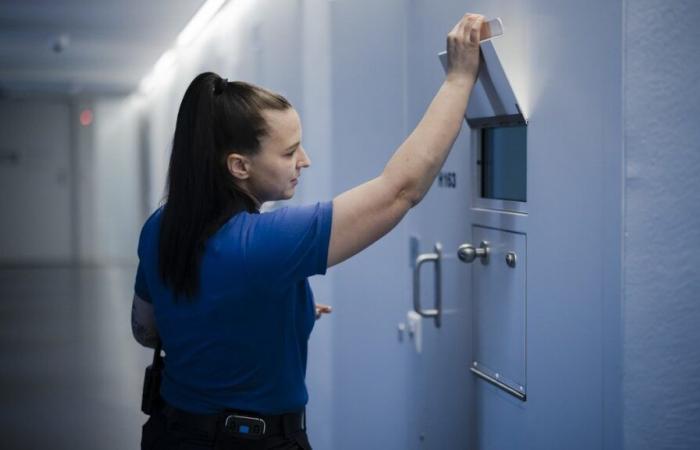The Swiss penal system “selects” and “incarcerates” poor people.Image: KEYSTONE
Swiss prisons are full of people convicted of minor crimes, imprisoned because they could not pay monetary penalties or fines. This situation is explained by a penal system which selects poor and marginalized people, explains a specialist.
Follow me
Last year, some 9,200 people were incarcerated in Switzerland, the Federal Statistical Office (FSO) said on Monday. A lot of them shouldn’t have been. “In the collective imagination, someone who is in prison is someone dangerous,” explains Louise Hauptmann, doctoral student in criminal law and author of a thesis on parenting in prison. “In reality, there are very few detainees who are truly detainees.”
“The big cases that made the headlines, like the Adeline affair or Claude D., are in the minority”
Louise Hauptmann
In fact, in Switzerland, most prisoners are incarcerated for minor offenses. Nearly half of prisoners released last year had served sentences of less than 30 dayswhile 66% had spent less than three months in detention. As recently recalled by Mailtraveling on public transport without a ticket or committing petty theft can result in a stay in prison.
This is especially true for a specific social category: poor people, who are over-represented in Swiss prisons. “Basically, punishment is always motivated by the commission of an offense,” notes Louise Hauptmann.
“Yet the criteria used to send someone to prison select poor people and foreign people, who are, often, both at the same time. For people who work on deprivation of liberty, this is obvious.”
Louise Hauptmann
The problem of alternative sentences
Result: “We incarcerate the poor, and the prison becomes a tool for managing poverty,” summarizes the researcher. For what? The answer is to be found in the functioning of the Swiss penal system, which provides several alternatives to incarceration. “It is often at this moment that the selection of poor people takes place,” explains Louise Hauptmann.
“These options require special conditions that marginalized people cannot meet”
Louise Hauptmann
Financial penalties and fines are the most explicit example. If the convicted person is unable to pay the amount demanded of him, he may be imprisoned. This is called an alternative custodial sentence.
Last year, more than half of people in prison (53%) were serving this type of sentence, recalls the OFS. In other words, more than half of them were not supposed to be in prisonbut found themselves behind bars because they could not pay a fine or monetary penalty. Only 38% of prisoners had been directly sentenced to a custodial sentence.
“By definition, it is poor people who risk not being able to pay. They are therefore the ones who risk ending up in prison for minor offenses,” explains Louise Hauptmann. The amount to be paid should adapt to the financial means of the convicts, she continues, but this is often not the case. “There is a minimum amount, set at 30 francs per day or, exceptionally, ten,” explains the researcher.
“We are talking about people who are already poor, who are often already in pursuit, and who do not necessarily have the means to spend 10 or 30 francs per day for 30, 50 or 100 days.”
Louise Hauptmann
Not to mention the fact that, sometimes, the financial penalties can be quite long: up to 180 days, which corresponds to 1800, or even 5400 francs in total. “It’s a lot of money,” comments Louise Hauptmann. “The Swiss middle class almost no longer goes to prison for minor crimes, unlike people who are penniless,” summarizes the Mail.
Pre-trial detention
Other alternatives to imprisonment also do not benefit marginalized people. To be able to obtain the electronic bracelet, you must have accommodation. To benefit from a semi-detention regime, allowing the prisoner to work outside during the day, you must have a job. Finally, community service cannot replace an alternative custodial sentence – it is prohibited by the Penal Code.
There is another decisive factor: for all these alternatives to detention, there must be no risk of flight. “Very often, we consider that foreign people present a flight risk, simply because they have another nationality,” says Louise Hauptmann. “This is particularly true when they do not have good social integration in Switzerland, for example when they do not have a job there.”
It also increases the chances that a foreign person will be incarcerated before trial. Louise Hauptmann summarizes:
“Foreign people are more often placed in pre-trial detention then, once they are convicted, they are more often incarcerated”
Louise Hauptmann
Criminogenic poverty
This situation has many implications. “There is clearly a vicious circle between prison and poverty,” says Louise Hauptmann. “First of all, poor people are more likely to commit crimes because it is a means of subsisting. Then, when they are imprisoned, they generally lose their housing and their jobs,” she explains.
The researcher gives the example of Vaud prisons, where salaries vary between 16 and 33 francs per day at 100%: “When these people leave, they no longer have anything,” she says. “If they were already poor, they are even poorer. Prison maintains poverty, which in turn is criminogenic.”
Not to mention the fact that Swiss prisons are overcrowded. Their occupancy rate is close to 95%, according to the OFS. This creates another problem: “There are not enough resources to ensure the social reintegration of truly dangerous prisoners,” denounces Louise Hauptmann.
“If incarcerated people were better selected, prisoners who really need imprisonment could be better taken care of”
Louise Hauptmann
A deliberate strategy?
Some researchers believe that the Swiss penal system specifically targets and punishes poor people and people with precarious status. Louise Hauptmann sees this more as “the result of a social and economic vulnerability of the people concerned than of an explicit desire to punish poverty”.
“These people do not have the means and the knowledge to defend themselves. They are stigmatized, cannot count on the solidarity of civil society – which knows little about their situation – and do not benefit from any lobby to defend them,” she explains.
Better representation could help change things. In Germany, for example, former prisoners founded a union around ten years ago to improve the working conditions of prisoners and draw public attention to their demands, recalls the Mail.
Such platforms do not yet exist in Switzerland, but alternatives are possible, believes Louise Hauptmann. “There is no need to invent new rules, just to use the possibilities offered by criminal law, which is not as fixed as we think,” says the researcher, who recalls that judges benefit from a certain margin of maneuver.
“Considering the risk of leakage in a more demanding manner would be progress. We could also be more creative regarding alternatives to incarceration.
Louise Hauptmann
Finally, better information could also play a role. “I think there is a real need to raise awareness to show the population that most of the people imprisoned are not who we think,” concludes the researcher.
The news in Switzerland is here
Show all articles







